Islamist Party Mobilization: Tunisia’s Ennahda and Algeria’s HMS Compared, 1989–2014
Autor Chuchu Zhangen Limba Engleză Paperback – 14 aug 2020
This book aims to explore how Islamist parties mobilize debates, discourses, and environments in electoral authoritarian systems. Interrelating three theoretical schools, Electoral Authoritarianism Theory, Protest Voting Theory, and Political Process Theory, it adopts and expands on a demand-and-supply framework to approach the subject in a novel way, and adapts them to address North Africa, a region in which such theoretical scholarship has until now not been conducted. In-depth case studies focus on two Islamist parties in North Africa, Tunisia’s Ennahda and Algeria’s HMS, both of which adopted the Muslim Brotherhood model, had charismatic leaders, and were active in the political scene from 1989-2014, the period between their first electoral trial and their electoral participation after taking part in governance. The chapters proceed chronologically, providing a historical treatment of the evolution of Ennahda and the HMS since their inception and addressing their development in two and a half decades.
| Toate formatele și edițiile | Preț | Express |
|---|---|---|
| Paperback (1) | 387.58 lei 6-8 săpt. | |
| Springer Nature Singapore – 14 aug 2020 | 387.58 lei 6-8 săpt. | |
| Hardback (1) | 392.37 lei 6-8 săpt. | |
| Springer Nature Singapore – aug 2019 | 392.37 lei 6-8 săpt. |
Preț: 387.58 lei
Nou
Puncte Express: 581
Preț estimativ în valută:
74.17€ • 76.52$ • 62.78£
74.17€ • 76.52$ • 62.78£
Carte tipărită la comandă
Livrare economică 04-18 martie
Preluare comenzi: 021 569.72.76
Specificații
ISBN-13: 9789811394898
ISBN-10: 981139489X
Pagini: 289
Ilustrații: XV, 289 p. 5 illus., 1 illus. in color.
Dimensiuni: 148 x 210 mm
Greutate: 0.4 kg
Ediția:1st ed. 2020
Editura: Springer Nature Singapore
Colecția Palgrave Macmillan
Locul publicării:Singapore, Singapore
ISBN-10: 981139489X
Pagini: 289
Ilustrații: XV, 289 p. 5 illus., 1 illus. in color.
Dimensiuni: 148 x 210 mm
Greutate: 0.4 kg
Ediția:1st ed. 2020
Editura: Springer Nature Singapore
Colecția Palgrave Macmillan
Locul publicării:Singapore, Singapore
Cuprins
1. Introduction.- 2. Theorizing Islamist Parties’ Mobilization at the Polls.- 3. Historical Background.- 4. First Trial at the Polls.- 5. Drastic Changes.- 6. Co-optation or Resistance?.- 7. Entering the 2010s.- 8. Conclusion.
Notă biografică
Chuchu Zhang is an Associate Professor at the School of International Relations and Public Affairs, Fudan University, China. She received her PhD in Politics and International Studies from the University of Cambridge, United Kingdom. Her research interests are in Middle Eastern politics, terrorism, and China-Middle East relations.
Textul de pe ultima copertă
This book aims to explore how Islamist parties mobilize debates, discourses, and environments in electoral authoritarian systems. Interrelating three theoretical schools, Electoral Authoritarianism Theory, Protest Voting Theory, and Political Process Theory, it adopts and expands on a demand-and-supply framework to approach the subject in a novel way, and adapts them to address North Africa, a region in which such theoretical scholarship has until now not been conducted. In-depth case studies focus on two Islamist parties in North Africa, Tunisia’s Ennahda and Algeria’s HMS, both of which adopted the Muslim Brotherhood model, had charismatic leaders, and were active in the political scene from 1989-2014, the period between their first electoral trial and their electoral participation after taking part in governance. The chapters proceed chronologically, providing a historical treatment of the evolution of Ennahda and the HMS since their inception and addressing their development in twoand a half decades.
Chuchu Zhang is an Associate Professor at the School of International Relations and Public Affairs, Fudan University, China. She received her PhD in Politics and International Studies from the University of Cambridge, United Kingdom. Her research interests are in Middle Eastern politics, terrorism, and China-Middle East relations.
Caracteristici
Examines how islamic beliefs interact with electoral democracy Gives a new heuristic for understanding MENA politics Explores how Islamic beliefs might be integrated into secular systems of government
